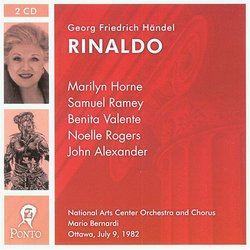| All Artists: George Frederick Handel, Valente, Alexander Title: Handel: Rinaldo Members Wishing: 1 Total Copies: 0 Label: Ponto [Mitridate] Original Release Date: 1/1/2006 Re-Release Date: 6/27/2006 Album Type: Import Genre: Classical Styles: Opera & Classical Vocal, Historical Periods, Baroque (c.1600-1750) Number of Discs: 2 SwapaCD Credits: 2 UPCs: 675754919825, 8717202250479 |
Search - George Frederick Handel, Valente, Alexander :: Handel: Rinaldo
 | George Frederick Handel, Valente, Alexander Handel: Rinaldo Genre: Classical
|
Larger Image |
CD Details |
CD ReviewsA breathtaking, exquisitely musical extravaganza E. A. Lovitt | Gladwin, MI USA | 12/22/2007 (5 out of 5 stars) "There is a very fine "Rinaldo" CD set on the market, with David Daniels and Cecilia Bartoli, if you prefer the vocal roles as Händel conceived them. (Okay, Daniels is a counter-tenor, not a castrato, but that's as close as we get, nowadays).
But do not neglect this Canadian National Arts Center CD of mezzo-soprano, Marilyn Horne's Rinaldo. Daniel's voice has beauty and agility, but Horne's singing has beauty, agility, sex, AND mystery. They are both impeccable Baroque musicians. After a calm and stately overture, Horne makes her entrance singing of love. She sings the beautiful "Scherzano sul tuo volto le grazie vezzosette" with her fiancée and after Almirena is kidnapped at the end of the duet, "Venti, turbini, prestate'' peals forth in a spectacularly coloratura call for vengeance. What a grand ending for the first act! (Even the Canadian audience lost its cool). Horne is in better form on this live recording than she was for her reprise of this role at the Met in 1984. Samuel Ramey debuted at the Metropolitan Opera House in 1984 as the Saracen warrior-magician, Argante, and if you listen to this 1982 Ottawa recording, you will understand why he was picked to sing it again in New York. Actually, Horne demanded that Ramey be cast in this role. His "Sibillar gli angui d'Aletto" is a showstopper both in Ottawa and New York City. Listen to Ramey's dark melismas twining through and around the clarion call of the trumpets. It is one of the most thrilling arias in this singer's formidable repertoire, and it is no wonder he brought down both opera houses with it. He follows up with the beautiful "Vieni, o cara, a consolarmi" that shows off the dark nether regions of his voice. What an instrument! `Rinaldo' also contains the haunting "Lascia ch'io Pianga," a soprano aria recycled from Handel's own earlier `Almira.' At this opera's premiere, the tune proved so popular the Opera management posted a notice next day: "Whereas by the frequent calling of songs again, the opera has become too tedious . . . the singers are forbidden to sing a song above once!" Benita Valente as Almirina draws one of this recording's most sustained ovations with this plaintive and affecting rejection of Argante's advances. The sorceress, Armida is sung by Noelle Rogers, and listening to her was a bit like watching someone getting on a bicycle for the first time and heading down a steep hill: exhilarating, but I was never sure whether she was going to hit the right note, or fly, screaming, into a ditch. According to one source, during a 1711 performance, real birds were loosed above the audience during this operatic interlude, "which left their mark not only on the opera and the press, in the persons of Addison and Steele, but on the heads of the audience." You'll have to supply your own birds and visuals for this performance, but otherwise it is a breathtaking, exquisitely musical extravaganza of Handel's first opera for the London stage. " |

 Track Listings (31) - Disc #1
Track Listings (31) - Disc #1